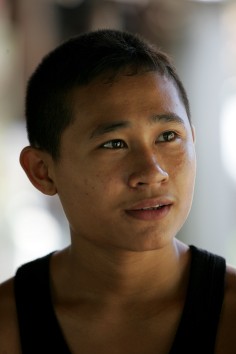Tens of thousands of ethnic Karen who fled fighting, and many born in Thai camp, fear reprisals if they are sent back to Myanmar
The Mae La camp near the Myanmar border which houses around 40,000 people. Photo: Andrew Chant
The only home that 15-year-old Kaw Wah has ever known is the Mae La refugee camp in Thailand's Tak province. It sits close to the frontier with Myanmar, but Kaw Wah has not visited the country his parents hail from.
"I've never been to Myanmar. I was born in Mae La and I've spent my entire life here," he said.

Kaw Wah, 15, was born in campKaw Wah is one of the 130,000 Myanmese refugees living in Thailand who have never seen their homeland.
Most, like him, are ethnic Karen who fled to avoid the fighting between the Karen National Liberation Army and Myanmar's military that has engulfed the country's southeast for much of the last 64 years.
Now, though, they face the prospect of being forced back to Myanmar, with Thailand making it clear it no longer wants them and other countries such as the United States refusing to accept any more group applications to resettle the Karen.
Pressure has been mounting for the refugees to be repatriated ever since Myanmar embarked on the democratic reforms that have seen the one-time pariah state welcomed back into the global fold.
Yet few are keen to return to the homes they have not seen for years, citing the ongoing violence as the KNLA continues to battle for its own independent state, and human rights abuses committed by Myanmar's army.
"It's not safe to return to my village. The Burmese might arrest us, or even kill us," said Kyaw Hkin, a 64-year-old grandfather who has lived in Mae La for 20 years. "We were treated very badly before. I've seen the army come into my village and beat people or make them be porters for the soldiers. I know they use Karen people to walk ahead of the army through minefields."
Nor does the United Nations High Commission for Refugees believe that the time is right for the refugees to be sent home.
It's not safe to return to my village. The Burmese might arrest us, or even kill us
REFUGEE KYAW HKIN
"At the moment, we feel the situation is not yet conducive for a safe and dignified return," said Vivian Tan, the UNHCR's spokeswoman in Bangkok.
"There will need to be permanent ceasefires and peace talks. Landmines will need to be mapped and cleared. There need to be guarantees of physical safety and that basic rights will be respected upon return."
The biggest of nine refugee camps strung along the Thai-Myanmar border, Mae La is a squalid collection of closely packed wooden huts, bisected by mud paths, that sprawls for over three kilometres.

Around 40,000 people are confined behind the barbed wire that marks Mae La's boundaries. Unable to work in Thailand legally, they are not even allowed to leave the camp for any length of time.
Despite that, a survey conducted this summer revealed that 90 per cent of the refugees in Mae La don't want to go back to Myanmar. But the Thai authorities are already planning their departure.
"The Thai officials have told us that maybe in the next year or two we will have to return," said Kyaw Hkin.
No longer regarded as a priority by aid organisations, the refugees' food allowance is now being progressively cut.
"In 2014, the rice ration will go down to eight kilos a month from the 12 kilos we get now. It's not going to be enough food for us. We'll go hungry," said a section leader in Mae La who asked to be known as Eh K Lu. "We're reliant on the donors and they say they have no more money for us."
Even with the prospect of starving in the camps, the refugees say they will not voluntarily return to villages and farms occupied by Myanmar's army and strewn with landmines.
"It's not going to be easy for the Thais to make us leave. We will resist being sent back. Even if the Thai army comes, we will defend ourselves," said Eh K Lu. "We've been here so long, this is our home now."
This article appeared in the South China Morning Post print edition as Refugees dread forced return to homeland

No comments:
Post a Comment